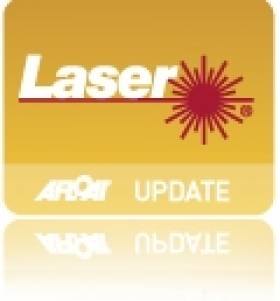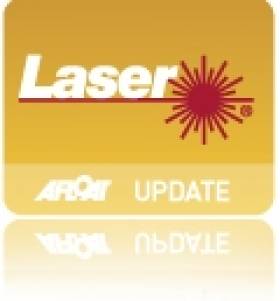Displaying items by tag: David Quinn
Howth Yacht Club Wins for Quinn, Cull In Laser Dinghy Frostbite Series
#lasersailing – Thirty seasoned Laser sailors were greeted with a Westerly at 8knots at Howth Yacht Club for the second race of the 40th Laser winter series, slightly calmer conditions than last week! The Race Committee had their work cut out for them as both the wind and fleet were making things difficult.
After a General Recall, the fluctuating wind delayed the restart and eventually stabilized from a SW direction. Taking no prisoners, the RC went with a Black flag and needless to say managed to catch one over the line early! Half of the fleet went left and the other right. Things started to get tricky at the top mark with the boats from the right just edging out those from the left. A bunch that included Daragh Kelleher, Ian McSweeney, Oliver Keenan, Ronan Cull, Dave Quinn and Mike Evans all rounded in quick succession. Those who stayed to the left of the run or up tide managed to make some good gains and round the LW mark in good position. Sailors jockeyed for position throughout the race as picking up the little puffs and shifts on the beat made for tight tactical racing.
Ronan Cull was the one and only sailor falling foul of the Black Flag, leaving Dave Quinn to take the bullet ahead of Oliver Keenan.
Race 2 got underway in lighter conditions after the wind veered back to the West. A clean start this time, and a last minute right hand shift biased the committee boat for the start. Some boats headed left, but the leaders came in from the mid-right once again! Dave Quinn and Troy Hopkins took the lead around the WW mark with the fleet in hot pursuit. Darrell Reamsbottom showed some great pace on the light air reaches to pull up to third by the Leeward mark, and eventually climbed to first early on into the second beat.
Heart Rates began to rise as the Race Committee shortened the course and sailors could see the finish line at the WW mark. The three boats left of centre were looking pretty good until Darragh Sheridan put in a "Brilliant Performance" (best of luck Daragh with the new book) on the last beat to throw the cat amongst the pigeons leading a bunch of boats in from the right in slightly better breeze. The wind died in the final third of the beat, and Ronan Cull showed good speed in the home straight to take the win. Closely followed by Oliver, Daragh, Darrell and Dave, who were only separated by a mere boatlength on the finish line.
Race 1 - Standard fleet:
1. Dave Quinn
2. Oliver Keenan
3. Ian McSweeney
4. Darrell Reamsbottom
5. Darragh Kelleher
Race 2 - Standard fleet
1. Ronan Cull
2. Oliver Keenan
3. Daragh Sheridan
4. Darrell Reamsbottom
5. Dave Quinn
Is Optimist Competition Pushing Kids Too Hard?
#opti – As Ireland prepares to welcome a record fleet of youngsters to the Optimist dinghy European Championships in Dun Laoghaire in four months time, Afloat.ie reader David Quinn questions the level of intensity of this winter's training and asks is this developing a life long love for sailing, or creating the environment where a tiny minority can push for Olympic Glory, while the rest take up another sport?
I live close to the Harbour in Howth, County Dublin so I tend to walk the pier or drive past the Yacht Club most weekends. This winter, much more than previous years, I have become really bothered and concerned at the extent of winter junior training sessions, particularly with the Optimist Class.
I started sailing relatively late so don't have much knowledge or experience of the Optimist Class. I started out in Mirrors before moving to Standard Rig Lasers. We trained hard, as an informal group, in Howth and competed internationally, but this was only in our late teens and early twenties. It is noticeable how many of my peers from that time are still sailing now and have a great love for the sport. I put that down to the huge fun we had racing Mirrors in Sutton Dinghy Club and at Regional events.
The major issues facing our sport are the fall off in memberships, declining activity and the lack of youth members in our clubs. I think a close scrutiny of the Optimist class would go some way to explaining some of the underlying problems in our sport!
I don't have an exact count, but the Optimists must have done at least four intensive training weekends, each with six hours of training per day. I'm not involved in the class so I can't be certain of the timing or intensity, but they seemed to launch before 10am and finish at dusk most days. I'm sure they came in for lunch. Is this developing a life long love for sailing, or creating the environment where a tiny minority can push for Olympic Glory, while the rest take up another sport?
I know some in the ISA are very concerned with this level of intensity for such young sailors, but the class, driven by over-ambitious parents, takes no notice. I doubt this is developing a life-long love for the sport, and I doubt it is even encouraging the kids to become elite sailors.
Maybe 1/100 will make it to senior international funded sailing? I would love to see a wider debate on the subject? I know when I was in my teens I sailed Mirrors and had a ball. It wasn't exactly an elite pathway class, but most of my peers from those days still race and sail very actively 25 years later. There must be a lesson there and it would make for an interesting study?
David Quinn (40) is a Laser and SB20 Sportsboat sailor from Howth Yacht Club and a former racing manager of the ISA.
Cull Wins Howth Laser Opener
HOWTH YACHT CLUB. LASER FROSTBITE WINTER (O'ALL) 31/10/2010 LASER STANDARD: 1, Joe Cull HYC (2.00); 2, David Quinn HYC (6.00); 3, Evan Dolan NYC (6.00); LASER STANDARD APPRENTICE: 1, Brendan Costello MYC (2.00); 2, Conor Hopkins HYC (4.00); LASER STANDARD MASTER: 1, David Quinn HYC (4.00); 2, Evan Dolan NYC (4.00); 3, Conor Greagsber NYC (7.00); LASER STANDARD GRAND MASTER: 1, Joe Cull HYC (2.00); 2, Michael Evans HYC (6.00); 3, Robin Hegarty HYC (6.00); LASER RADIAL: 1, Darragh Peelo MYC (2.00); 2, Simon Revill HYC (4.00); 3, Ciaran Costello MYC (6.00)































































